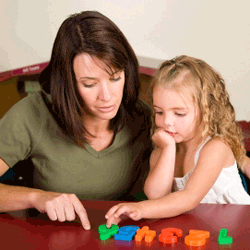Language Difficulties in preschool children: When to worry and how to help

You should worry if a 1-year-old child...
You should worry if a 1-year-old child...
- Produces only a few sounds (little vocalizations or babbling)
- Does not respond to his name
- Does not recognize familiar objects when named (e.g. blanket, bottle)
- Does not point
Language Stimulation up to 1 Year of Age
Language Stimulation up to 1 Year of Age
Before 6 months
- Talk about what you are doing
- Repeat the sounds the child makes
- Position yourself so that the child can see your face
- Talk about the different sounds the child hears
- Respond verbally when the child touches you, looks at you, or makes sounds
- Exaggerate intonation; use facial expressions
Between 6 and 12 months
- Speak in short sentences
- Label what the child is pointing to
- Play with sounds: repeat sounds that the child produces
- Play simple games, e.g.“peek-a-boo” and “pat-a cake”
You should worry if a 1 1/2-year-old child...
You should worry if a 1 1/2-year-old child...
- Produces no words (even “mama”, “dada”)
- Does not respond to his name
- Only produces vowels
- Communicates only with gestures
- Produces little jargon
- Does not imitate
- Does not understand routine commands (e.g. “Sit down”, “Give me”)
You should worry if a 2-year-old child...
You should worry if a 2-year-old child...
- Understands few, if any words
- Does not imitate sounds or words
- Has few intelligible words
- Does not combine two words together
Language Stimulation from 1 to 2 Years of Age
Language Stimulation from 1 to 2 Years of Age
- Use short sentences
- “Read” a storybook in your own words
- Pay attention to what the child is saying instead of how he is saying it
- Don’t withhold objects and insist that the child speak
- Don’t insist that the child speak perfectly Repeat his message yourself and correct the errors.
- Do not use “baby talk”
You should worry if a 2 ½ year-old child…
You should worry if a 2 ½ year-old child…
- Does not understand choice questions
- Cannot follow simple commands in context
- Is not understood by his parents
- Can only name a few objects
- Rarely produces 2-word combinations
You should worry if a 3-year-old child...
You should worry if a 3-year-old child...
- Does not recognize the name of familiar objects
- Does not understand simple questions (ex. Who?, What?)
- Does not understand two-step instructions without natural gestures (ex. “Take off your coat and put it on the chair”)
- Does not understand basic concepts (ex. up/down, big/little)
- Communicates non-verbally (i.e. gestures) or combines words with gestures to express most of his ideas
- Rarely makes phrases of three or more words
- Is still unintelligible to his parents
Language Stimulation from 2 to 3 Years of Age
Language Stimulation from 2 to 3 Years of Age
- Describe what you are doing
- Listen when he speaks to you
- Speak to him often
- Produce words and sounds correctly, without asking him to repeat.
- Add words to his sentences
- Do not ask too many questions. Make comments instead.
- Expose the child to rhymes and songs
- Read/tell a story every day
You should worry if a 4-year-old child...
You should worry if a 4-year-old child...
- Repeats the question instead of answering it
- Does not understand questions which refer to past events
- Answers questions inappropriately
- Has difficulty understanding spatial concepts (e.g. “under”) as well as colour concepts
- Uses telegraphic phrases (ex. “Doggy running fast”)
- Searches for words
Language Stimulation from 3 to 4 Years of Age
Language Stimulation from 3 to 4 Years of Age
- Let the child help you do things; talk about what you are doing
- Encourage the child’s conversations by paying attention, showing that you are interested
- Vary the topic of conversation
- Let the child tell stories using books and pictures.
- Let him play with other children
You should worry if a 5-year-old child...
You should worry if a 5-year-old child...
- Has difficulty answering open-ended questions (e.g. “Why is the boy crying?”)
- Has difficulty understanding complex directions (e.g. “before/after” or several steps)
- Has difficulty grasping abstract concepts (ex. time, first/next/last)
- Is often off-topic
- Does not produce complex sentences
Language Stimulation from 4 to 5 Years of Age
Language Stimulation from 4 to 5 Years of Age
- Talk about what you are doing together
- Include the child in planning activities
- Talk about the ideas in stories you read
- Encourage imaginary play
- Don’t expect perfectly clear speech
- Do not insist that he repeat correctly of perform for others
A few definitions
Communication
Communication
- used to interact with other people
- verbal communication: words
- non-verbal communication: gestures & facial expressions
Receptive language
Receptive language
- verbal comprehension
Expressive language
Expressive language
- why you talk: requesting, responding, describing
- what you talk about: what has happened, where, why
- how you talk: vocabulary, sentences
Speech
Speech
- Articulation (pronunciation)
- Voice (e.g. hoarse voice)
- Fluency (stuttering)
- Resonance (nasal speech)
Looking to learn more? Watch our video on stuttering, with Speech Language Pathologist, Lisa Massaro.
Caroline Erdos M.Sc.(A), S-LP(C)
Elaine-Pelland-Blais M.O.A,
Elaine-Pelland-Blais M.O.A,
Montreal Children's Hospital


